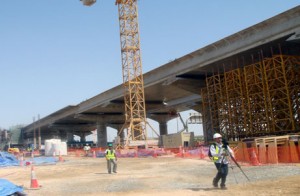Source: www.ameinfo.com
The last years of the Noughties put Arab sovereign wealth funds in the limelight of global capital movements. But will the government-controlled funds continue to invest abroad as much as they have in the past? With the economic crisis having disclosed structural problems at home, a paradigm shift seems to be inevitable.

According to the Sovereign Wealth Fund (SWF) Institute there are 55 SWFs globally. Fourteen of them are based in the GCC, and half of them are investment funds linked to the UAE. With an estimated $900bn, the Abu Dhabi Investment Authority (ADIA) is estimated to be biggest SWF in the world.
One concern expressed by Western states during the Dubai World debt crisis last December was that Arab Sovereign Wealth Funds will withdraw from their European and US investments in order to raise cash for troubled firms at home. The repayment of a $3.52bn Sukuk by Dubai World’s real estate subsidiary Nakheel which matured on December 14 was only secured due to a $10bn bailout package from Abu Dhabi. A reason to retreat from stakes overseas?
That might be far-fetched, as the Gulf States have been investing abroad since the 1960s. The Gulf’s oldest SWF, the Kuwait Investment Authority (KIA) for example, has been a major shareholder at German car producer Daimler since 1974. Not even the eight-month long Iraqi occupation in 1990/1991 could harm this long-term investment.
“Although the term SWF entered the mainstream in recent years, Arab capital spent by governments in Western blue chip firms is not new. These funds were only labelled differently,” explains Dr Nasser Saidi, Chief Economist at the DIFC Authority.
Shift in expectations
At a first glance, the partnership seems to be still intact at the beginning of the new decade. In March 2009 Abu Dhabi’s Abaar Investments became the largest shareholder in Daimler when it bought a 9.1% stake worth $2.9bn, overtaking Kuwait’s 7.4% share. Abaar announced in November 2009 that it aims to double its share. Qatar’s SWF, The Qatar Investment Authority (QIA) holds 10% at Credit Suisse, Switzerland’s leading bank (the ‘CS’, as the Swiss use to call the bank, overtook its troubled rival UBS in 2009).
At a second glance, it is clear that the times when SWFs were satisfied with receiving annual dividend payments from their peers are over. Daimler, for example, had to commit itself in building the research and development of electric cars in Abu Dhabi in exchange for Abaar’s engagement.
The oil-rich emirate of Abu Dhabi (home to a tenth of the known oil reserves) also showed that it has not only money but also teeth. On December 16, Abu Dhabi sued Citigroup over a $7.5bn investment it conducted in 2007. Abu Dhabi said the US Bank engaged in “fraudulent misrepresentation” in a 2007 fundraising in which the SWF invested $7.5bn in convertible bonds. ADIA has lost about 90% since then.
Far Eastern opportunities
Moreover, new opportunities in the Far East mean a lesser focus in the occidental continents. The green shoots of a Sino-Arabian capital partnership became visible only in recent years. In April 2008, one of Dubai’s SWFs, Dubai International Capital (DIC), launched, along with China’s First Eastern Investment Group, China Dubai Capital, which will target opportunities in China’s growing economy.
This $1bn investment vehicle seems tiny against leading names, but a start has been made. The same year, the DIFC and Hong Kong agreed to build up a common capital market for Islamic financial instruments. This was the result of a landmark visit made by Dubai’s ruler and UAE‘s Vice President HH Sheikh Mohammed Bin Rashid Al-Maktoum to the People’s Republic of China during that time.
The history of the DIC gives proof that the SWFs do not seek either perpetual allies or eternal partnerships. In February 2005, DIC purchased a 2.2% stake in Daimler (which at this time was Daimler Chrysler AG) at €32 per share. In May 2007 DIC sold its entire stake with an almost 100% profit. Only the SWFs policies and interests are perpetual: to seek investments with the highest rate of return and to secure their country’s wealth.
A new symbiosis for growth
Will the Oriental sun rise and shine only in the East during the Twenty-Tens? “We cannot confirm that Arab investors will neglect the West in favour of the Far East,” explains Jeff Culpepper, Managing Director and Vice-Chairman of the Credit Suisse Investment Banking Department in the EMEA region. “But growing ties between the GCC and China in particular can lead to a broader asset allocation opportunity, making Arab SWFs less dependent on developments in the US and Europe.”
The GCC, with its 40 million inhabitants, is no longer ready to export its oil, gas and the revenues from the exports. The SWF’s in the GCC are keeping their cards closer to their chests than ever. Independence is high on the agenda of GCC countries. This might trigger a retreat from investments abroad.
“The Middle East has a whopping $2.2 trillion infrastructure projects in the pipeline,” says Dr. Saidi. While the world’s tallest tower Burj Khalifa (formerly Burj Dubai) is rather of a symbolic added value to the UAE economy, finished projects such as the Dubai Metro or the upgrade of Dubai buses signal the way into the right direction.
Reversal of investment flow
From A for Ambulance stations through to Z for Zero-Carbon Cities, the region is in need of almost everything to upgrade its civil environment. “The objective of the new decade is to integrate and link free-zones and industrial parks in the GCC, since they mostly operate in a standalone environment.” The Dubai Metro, which launched in September 2009 is so far the only railway system operating on the Arab peninsula.
But Qatar kicked off its own railway project last November worth $25bn, in which Germany’s Deutsche Bahn will hold a 49% stake. Deutsche Bahn, which is owned by the state, is seeking more orders from the GCC, where a total of $113.5bn worth rail projects are planned or under construction. Will roles reverse? Will Western states increasingly invest in the Middle East in order to secure mandates for their firms and therefore jobs at home?
With $2.2bn infrastructure projects in the pipeline, it is hard to believe that capital will be sent throughout the world easily as in the past. Moreover barriers to trade are on the rise. “My country first”, might be the topic of the 201x years, if protectionism gains pace.



















